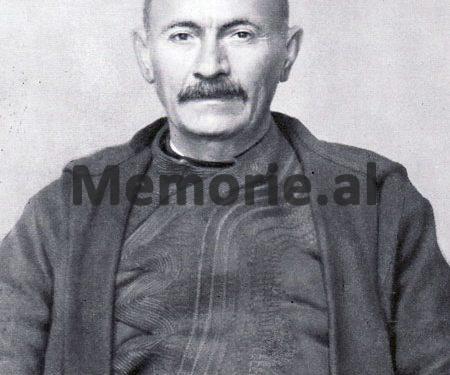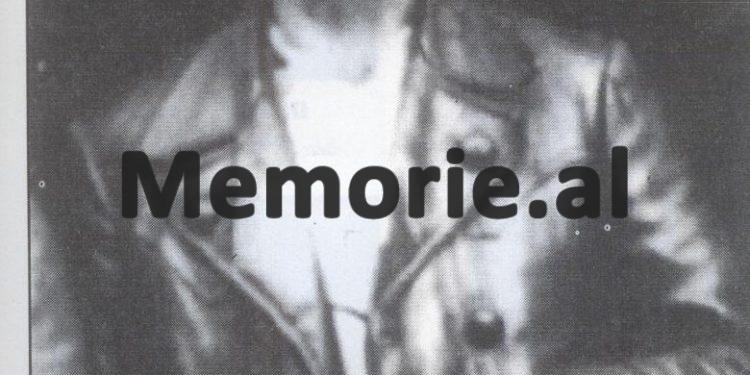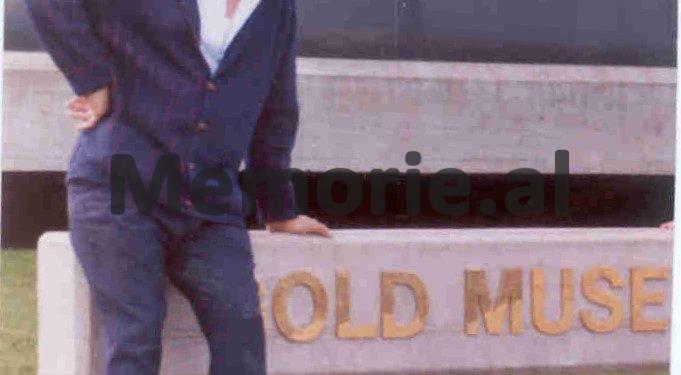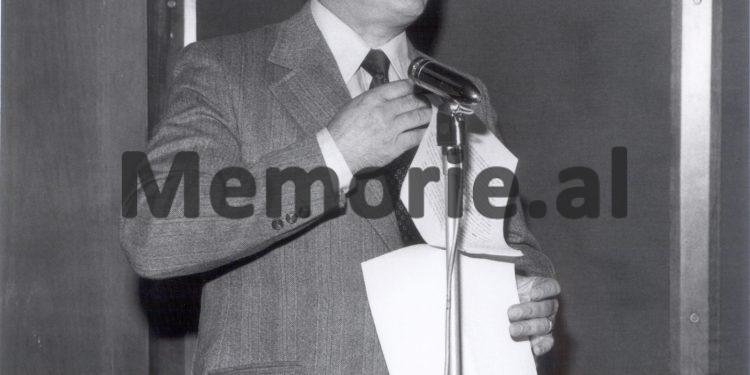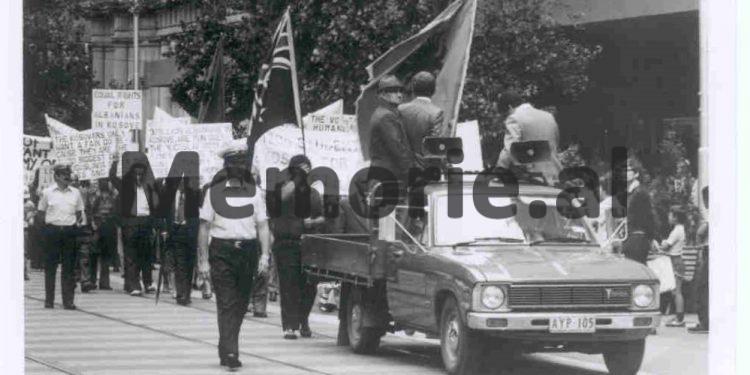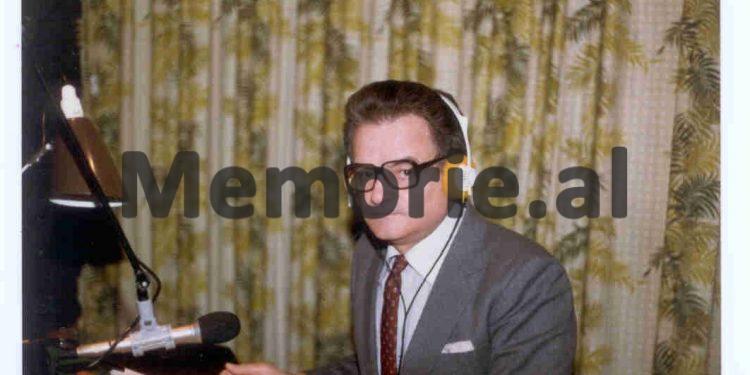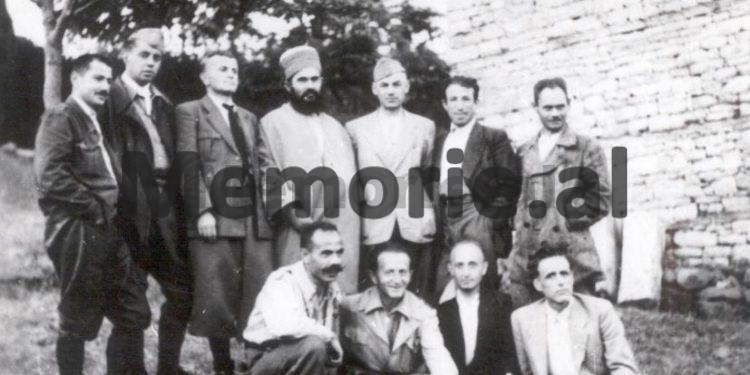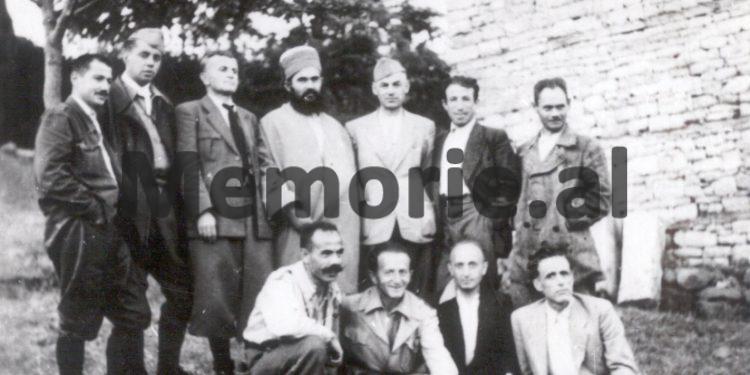Dashnor Kaloçi
Memorie.al publishes the unknown story of Hiqmet Ndreu, from the famous Ndreve tribe of Slovo e Dibra, known mainly by Elez Isuf Ndreu, the legendary leader of the Dibra insurgents in the wars against the Serbo-Montenegrin chauvinists, and his son, Cen Elezit, of Major General Dali Ndreu and Colonel Esat Ndreu, where their house in the village of Slovo, became one of the most powerful bases of the Anti-Fascist War, and as a result, Cen Elezi in 1945, was elected vice-president of the Democratic Front headed by Enver Hoxha. How the persecution of the Ndreu tribe began in 1946, when Cen Elezi was declared an “enemy” and, together with his sons, was forced to flee to the mountains and then flee Albania. The testimony of Hiqmet Ndreu, one of the grandchildren of the famous tribe since 1952, together with his two cousins, escaped from exile in Llakatund, Vlora and escaped from Albania, first leaving for Yugoslavia and then gaining political asylum for in Melbourne, Australia, where for 22 years he directed the show “Voice of Free Albanians” on Radio Melbourne.
Hiqmet is descended from the Ndreu tribe of Slovakia, which is one of the most famous tribes not only in the District of Dibra but also throughout Albania. Hiqmet’s father was named Islam Ndreu and was one of the children of the famous Cen Elezi, a nationalist who, after being brutally persecuted by Enver Hoxha’s communist regime, fled to Yugoslavia with some of his sons, where he died. Skopje prison from the tortures of Tito’s Slavo-Communists in 1949. The body of Hiqmet Ndreu’s family, in addition to that of his father Islam, grandfather Cen Elezit, continues with his great-grandfather, Elez Isufi, who is not well known. only throughout Albania, but also in the history of the Balkans. After Elez Isufi, Suf Xhelili, and Cen Elezit, who left a great name in the history of Albania, during the years of the fascist occupation of Albania, other no less famous men emerged from the trunk of the Ndreu tribe who continued the tradition. patriotic of that family. Among them were Dali Ndreu and Esat Ndreu, who with the ranks of general and colonel, led the large partisan formations during the Anti-Fascist War. But all the great contribution that the men of this family made to Albania was immediately erased right after the end of the war by the communist regime of Enver Hoxha, who pursued and persecuted in the most barbaric way the suckers of that tribe, starting from Cen Elezi, Daliu and Esati, and in turn: Xhelal Ndreu, Mehdi Ndreu, Xhetan Ndreu, Mersin Ndreu, Gani Ndreu, Selman Ndreu, Tafil Ndreu, Riza Ndreu, Isa Ndreu, and even the generation of Hiqmet Ndreu, who escaped communist revenge, took the roads of exile, fleeing Albania. As a result of the unprecedented genocide pursued by Enver Hoxha’s communist regime against this family, 6 men were boiled or shot, 20 others were sentenced to over ten years in prison, 12 boys escaped from Albania to escape persecution, and Another 55 families from the Ndreve trunk were sent to internment camps, where they suffered from 1946 to 1991. One of those sons of this famous tribe who escaped from Albania to escape the savage persecution of the Slavo-Communists was Hiqmet, who after many vicissitudes settled in Australia, where for twenty-two years, directed a program in Albanian entitled “The Voice of Free Albanians”. In this regard, Hiqmeti told us in an interview that memorie. al is publishing in this article.
Mr. Hiqmet, you are from the well-known Ndreu tribe of Dibra, what can you tell us more specifically about yourself and your family?
I was born on March 20, 1932, in the village of Slovo in Dibra, and my father, Islam Ndreu, was one of the 15 children of Cen Elez, the son of Elez Isufi, who is well known in Albanian history. My father Islami graduated from the Harry Fultz American School in the late 1920s and was one of the best students at that school. This was written by Harry Fultz himself in his memoirs published in the USA. After graduating from that school, his father worked as the Mayor of Kryevidhi in Kavaja and later as the Mayor of Shijak.
During the years of fascist occupation, what was his activity?
After the invasion of Albania by Italy, the father refused to serve as Mayor and resigned from that position and returned to Slovakia together with Kole Tromara. During the war years, like all the other men in our tribe, my father, Islam, as a nationalist, became closely associated with the Anti-Fascist Movement.
When did the persecution of your family by the communist regime of Enver Hoxha begin and what were the causes?
The persecution of our tribe Ndreu and at the same time of my family began in March 1946 and the main reason was that: my grandfather Cen Elezi was declared an enemy by the communist regime of Enver Hoxha that came into force in December 1944.
The beating of your grandfather Cen Elez did not start immediately after the end of the war?
No, it started there in March 1946, and until then Cen Elezi was not very upset, perhaps because there was still some respect for his brother Esat, a former partisan brigade commander and major general. Dali Ndreun, commander of the First Corps. At that time, in March 1946, along with my grandfather Cen Elezin, who fled to the mountains, my father Islami and his brothers escaped. At the time of Islam’s escape, our family was interned in Berat Castle, along with 50 other members of our tribe. In May 1946, his father, Islami, with his brothers Selman, Xheladin, Xhelal, Rizain, Baftjari, Haliti, Irfan, etc., surrendered after an amnesty granted by the communist government of Tirana. While his grandfather Cen Elezi, with his brother Mediu, and some of the other boys escaped and went to Macedonia, where he died under torture in Skopje, in 1949.
What happened to your father Islam and the others who surrendered, were they forgiven?
They were tried in Peshkopi and their father, Islam, and his brother, Jalal, were sentenced to 15 years in prison each, while the others were sentenced to at least ten years in prison.
What about you, until you were interned in Berat?
In Berat, we stayed until the time the father surrendered with some of his brothers and after their surrender, part of our tribe (less than half) released us from Berat and left us to return to Slovakia, where we our houses, which were the largest in the whole province, had been burnt to ashes. But after two years, my family and I: my mother, my two brothers (Pëllumbi and Kapllani), and my sisters have interned again in Llakatund, Vlora, where we lived in a terrible economic situation. Some of our cousins of the Ndreu tribe also came with us as internees.
How long did you stay in exile there in Llakatund?
I personally stayed in Llakatund until March 2, 1952. At that time, together with my two cousins, Nazmi and Faik Ndreu, we left Albania and fled to Yugoslavia.
Who were Faik and Nazmi?
Faik was the son of Dick Xhelili, who together with his brother Suf Xhelili had fought against the Serbs, while Nazmi was the son of Gani Ndreu, who was killed in an attempt with the communists in 1946.
How could you escape being exiled?
After making the escape plan with the two cousins, Faik and Nazmi (then 42 and 19), we took advantage of the four days off, which were given at the time on the eve of the Labor Party Congress to be held in Tirana. Two days before Congress, we came to Tirana by bus, and from Tirana to Debar we went for three days, traveling on foot to the mountains.
Where in Debar did you take refuge?
In Debar, we took refuge with our son-in-law, Sami Erebara, in the village of Erebarë, who kept us at home for three days. After three days we secretly went to our village of Slovo, where we saw the burnt houses, and after spending half an hour with them, we took some weapons that Faiku had hidden before we were interned, in a place called Lisivadhe.
Where did you go next?
From there we set off in the direction of Korabi Mountain, where the state border was, and we went to the place called Laku i Xhypve. When we got there, we saw the border guards following us to surround us, and we immediately opened fire on them. As the border forces withdrew, we went beyond and foamed in the village of Tanusha. There we took refuge in the first house we came across, and the next day they handed us over at the Rieka border post, where three UDB officers interrogated us.
What were they asked about?
They wanted to know if the Albanian state had sent us on a mission, but we told them that we had fled to escape the Bolshevik regime in Tirana. Those things were formalities because as soon as they found out that we were from the Ndreu tribe, they no longer had any doubt that they knew us well.
Where were they taken later?
After three days, they took us to Gostivar and then to a camp in Struga, where after keeping us for six months, they sent us to Vranje, Serbia, where our uncles, Cen Elez’s sons: Nuzi, Tafili, Hakiu, Elezi, and Mediu, were staying. Cen’s brother. They had escaped with their grandfather Cen Elezin.
How could they have survived after Ceni’s execution?
In 1948, when relations between Albania and Yugoslavia deteriorated, Ceni’s other sons, along with his brother, Mediu, were released from prison and wanted to use them against Albania. But they refused, saying they were not becoming tools for Yugoslavia, and so they had remained in Vranje, along with many of Albania’s other nationalist families.
How long did you stay in Vranje and where did you go next?
From Vranje, together with Nazmi, Tafil Ndreu, and 35 other Albanians, they allowed us to continue the gymnasium in Prishtina. Four years later, when we were taking the exams (I had Adem Demaçi in class), two UDB officers came and picked us up and took us to the internment camp in Gerova, Croatia. Where there were other Albanians from Albania’s anti-communist families, they held us for 19 months, and at that time an American charity came and took us to Italy, to the Capua camp near Naples. After staying for 19 months in Capua, me and Mediu, an Australian charity came and picked us up and sent us to Australia. Other members of the Ndreu tribe, who were there in Capua, were granted political asylum in the United States, a few days after we fled to Australia.
What activity did you do in Australia?
In Australia, we immediately got in touch with the Albanian community of Melbourne and there we created an association called “Albanian Center”. Since we were all Muslims, she was called Melbourne’s “Albanian Muslim Center” and her secretary chose me. Our association was given the right to have a special show in the Albanian language, on the State Radio of Melbourne, and to direct that show, I was assigned together with Professor Luk Çuni and Bahri Bregu.
What did that show contain and how many hours did it air?
That show that we broadcast two hours a week near Melbourne Radio, we titled “The Voice of Free Albanians” and was of a general, political, socio-cultural, historical character, etc., but more there was politics. After the departure of Prof. Lukë Çuni and Bahri Bregu, who were old, I directed that show all alone.
In that show, did you make propaganda against the communist regime of Enver Hoxha?
Almost all of that show was anti-communist propaganda against the regime of Enver Hoxha and against the policy that Serbia and Greece were pursuing towards Albania. At that time I did some shows where I treated the Greek massacres against Albanians. which was quite well received. This show had a wide audience and I constantly received letters from the Albanian diaspora in Australia thanking me for what we dealt with in our show.
Were there any reactions from Serbian and Greek circles after those shows?
The reactions were immediate and I was attacked by the North-Epirote circles, who asked the Australian government to remove me from Melbourne Radio. After that, the Director of Programs, Wilson, filed several charges against me with the Director-General, in order to remove me immediately. The Director-General called me to his office and asked if the charges against me were true. I told him: “I am Albanian and everything I have said against the Greeks is true.” After that, I presented the book published by the New York Academy of Sciences, entitled “How the Kingdom was Raised in Albania”, where American academics themselves addressed the crimes of the Greeks against the Albanians. After seeing the book, the Director-General told me: “Mr. Ndreu, are you able to refute what you have said about the Greeks?” I revolted and replied: “I will never do such a thing to refute the resistance and the struggle of the Albanian people because I would commit the greatest betrayal of my people.” After that, when he left, he told me, “Try to soften the nationalist tones a little bit,” but he didn’t close the show.
Did the Communist Government of Tirana have any problems during that time?
During all those years that I directed that show, official Tirana, through the State Security and also the UDB, introduced some of their agents in order to hinder me and both parties followed me and did their best to fire me. . The Serbian newspaper Novosti protested against me and called for my removal from Radio Melbourne. The UDB and the State Security through their agents petitioned the General Directorate of Radio Melbourne to remove me from there. The main organizer of that petition was the Albanian Security agent, Sh. Ll., But again they did not achieve the goal, because the General Director took me under his protection. Official Tirana had also declared me one of its main enemies. My sister was told this in the 1990s when she asked for a passport to come to me in Australia.
What did they tell your sister?
They told him: “We will not give you a passport to meet Hiqmet Ndreu, our greatest enemy who vomits bitterness against us.”
How long did you continue your show on Melbourne Radio?
I continued the show until 1991 when the communist regime in Albania was overthrown and then I closed it because it had achieved its goal./Memorie.al






